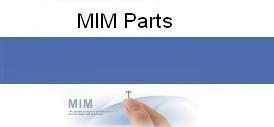A newly approved ASTM standard is expected
to advance the use of metal injection molding (MIM) as a manufacturing
method for medical implants.
ASTM F2989 is a new international specification that covers unalloyed
titanium components that are used for surgical implants. It was
developed by Subcommittee F04.12 on Metallurgical Materials, part of
ASTM International Committee F04 on Medical and Surgical Materials and
Devices.
"Through ASTM F2989, the material properties of metal injection
molding (MIM) unalloyed titanium components can be directly compared to
components that are made with conventional methods," says Matthias
Scharvogel, managing director, Element 22 GmbH, and an F04 committee
member.
That's important, says Scharvogel, because Metal Injection
Molding (MIM) could reduce costs
compared to titanium alloy implants produced via competing methods.
ASTM F2989 will also be used as the basis for laboratories that test
the material properties of the metal injection molding (MIM) component. The
standard also defines the requirements as a baseline for the regulatory
bodies.
ASTM F2989 covers the chemical, mechanical and metallurgical
requirements for three grades of metal injection molding (MIM) unalloyed
titanium components to be used in the manufacture of surgical implants.
Scharvogel has been working for several years with German research
organizations to developing molding grades of titanium alloys that could
be formed into complex shapes while maintaining excellent mechanical
properties.
He formed Element22 in 2011 after acquiring TiJet Medizin-technik of
Kiel, Germany. Its key asset is a proprietary titanium feedstock.
Molding processes have been optimized for the feedstock.
The technology is based partly on projects conducted with Fraunhofer
IFAM, Bremen, Germany, and HZG Helmholtz-Zentrum, Geesthacht, Germany. A
production line for medical MIM components made from the special
titanium was established in 2004.
Advantages of titanium for medical applications include its high
strength, low density and corrosion resistance. Scharvogel says that the
proprietary molded titanium parts have mechanical properties comparable
to wrought titanium.
The titanium implant will compete with engineering plastics, such as
polyetheretherketone (PEEK), which are often machined from stock shapes.

